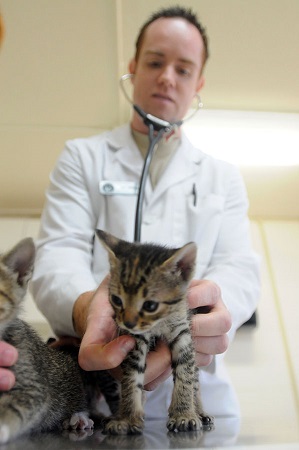Upper Respiratory Infections in Cats -- Causes, Symptoms, Treatments, Prevention
If you've met a few kittens in your lifetime, chances are you've encountered more than one with runny eyes, who sneeze a lot and appear to be just miserable. This is because kittens are highly susceptible to upper respiratory infections. Unfortunately, these infections often lead to secondary infections that cause more problems. Kittens with moderate to severe infections lose their appetite and fail to thrive.
Adult cats too commonly suffer from upper respiratory infections as the majority of domesticated cats are exposed sometime during their lifetimes to the viruses and bacteria that cause these infections, according to A-Z Vets. After initial infection, an incubation period can last from two to ten days before symptoms manifest.
What can we do to help?
 It's important to first, learn the causes, symptoms, and treatments for these ailments so that we can provide appropriate care and in many cases prevent the infections from being transmitted from cat to cat or from carrying the viruses from cat to cat ourselves.
It's important to first, learn the causes, symptoms, and treatments for these ailments so that we can provide appropriate care and in many cases prevent the infections from being transmitted from cat to cat or from carrying the viruses from cat to cat ourselves.
Causes
Viruses are the primary cause of upper respiratory infections in cats, according to WebMD. The two most common viruses involved are Feline herpesvirus type 1, also known as feline viral rhinotracheitis or FVR, and Feline calicivirus, typically known by its initials, FCV. The bacteria Chlamydia felis and Bordetella bronchiseptica are two additional known culprits.
Both FCV and FVR are particularly contagious both through direct and indirect contact. For example, obviously sneezes and coughs from an infected cat contain highly contagious viruses and/or bacteria in the expelled mucus. However, infections can be transmitted via bedding, toys, litter boxes, shared food and water bowls. Unfortunately, a cat that has suffered an upper respiratory infection caused by FCV or FVR can cast off virus particles for months after the initial infection, according to A-Z Vets.
Once a cat is infected with FVR, he remains infected for life. Oftentimes, the virus appears dormant for extended periods, but if the cat becomes stressed for any reason, the virus appears to wake up and the infected cat is once again contagious to others. Please be aware that this can occur years after the original illness.
We can spread the virus also from one cat to another on unwashed hands and contaminated clothing. Therefore, it's extremely important if you've been near an infected cat to disinfect your skin and clothing before going near a second cat.
Symptoms
Symptoms of upper respiratory infections in cats include sneezing, watery and red eyes, fever, congestion, loss of appetite, and general sluggishness. In addition, cats infected with FVR specifically may suffer from eye ulcers and mouth ulcers may be present in cats infected with FCV. Kittens and younger cats may also limp when infected with FCV.
One strain of FCV, specifically virulent systemic calicivirus, has been known to be deadly even in otherwise healthy adult cats. The symptoms, in addition to those listed above, include yellowing of the gums, sores on the head and legs, and swelling, among others.
Even without serious complications, cats can suffer with these symptoms for up to three weeks. During this time the cat is highly contagious.
Treatments
Treatments for upper respiratory infections in cats are based on the type of virus involved and the symptoms exhibited. For example, a general antibiotic may be prescribed if bacteria are the cause or to prevent a bacterial infection from causing further complications during a viral infection.
Soft food is recommended to encourage cats suffering from a loss of appetite to eat, as soft cat foods typically have a stronger smell. Cats that become dehydrated may need intravenous fluid, which typically requires hospitalization. Rest and comfort too, go a long way in relieving the stress of the illness and speeding up recovery. Typically, if the infection is not life-threatening, the symptoms can be treated at home.
Antiviral eye drops may be prescribed for cats suffering from sores in the corneal area.
Outlook and Prevention: What We can Do
One action we can take to prevent the spread of FVR and FVC is to have all kittens vaccinated then make sure the cats have a one-year booster and thereafter vaccinated annually if at high risk for infection. The FVRCP vaccine, although it does not offer total protection against FVR, can greatly reduce severity of the illness and prevent or reduce the frequency of recurrence. Ask your vet about a booster schedule specific to your situation.
 Keep your cat indoors and away from strange cats. It's particularly essential to keep any infected cats quarantined from other animals. In addition, since research has shown that stress plays a role in recurrence of FVR, it's important to prevent our cats from suffering in stressful situations. Boarding facilities, animal shelters and cats shows are places where infections are readily spread, according to VCA Hospitals. Avoid these whenever possible.
Keep your cat indoors and away from strange cats. It's particularly essential to keep any infected cats quarantined from other animals. In addition, since research has shown that stress plays a role in recurrence of FVR, it's important to prevent our cats from suffering in stressful situations. Boarding facilities, animal shelters and cats shows are places where infections are readily spread, according to VCA Hospitals. Avoid these whenever possible.
For pet owners who have more than one cat, it's important to regularly disinfect items your cats share. For example, litter boxes, food bowls, toys, and bedding material are known to harbor viruses and bacteria and need regular thorough cleaning. Also, if you bring a new furry member into your family, first have your vet examine the new cat and try to keep it isolated for approximately two weeks in case an infection is in the silent incubation period.
If you think your cat may be suffering from an upper respiratory infection, get her examined by a veterinarian as soon as possible in order to start the proper treatment. When left untreated respiratory infections can lead to pneumonia and other life-threatening complications. Also, if you have medical questions about this or any illness, ALWAYS seek the advice of a licensed professional.
References:
A-Z Vets: Upper Respiratory Infection in Cats - Causes, Symptoms and Treatments
Pet Health Network: Feline Upper Respiratory Infection
VCA Animal Hospital: Feline Upper Respiratory Infection
WebMD: Upper Respiratory Infections in Cats
